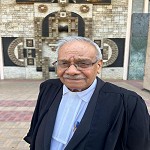Constructive res judicata
 Vinayak Patil
(Querist) 03 May 2025
This query is : Resolved
Vinayak Patil
(Querist) 03 May 2025
This query is : Resolved
If a plaintiff did not cross examined himself and not entered in witness box as witness and for giving evidence then constructive res judicata will apply to subsequent suit?
 Dr. J C Vashista
(Expert) 04 May 2025
Dr. J C Vashista
(Expert) 04 May 2025
YES, it attracts res judicata.
The Concept is enshrined under Section 11 of Code of Civil Procedure, 1908 (CPC) whereas the concept of Constructive Res Judicata is provided by Section 11 Explanation IV of CPC.
Section 11 - Res judicata - No Court shall try any suit or issue in which the matter directly and substantially in issue has been directly and substantially in issue in a former suit between the same parties, or between parties under whom they or any of them claim, litigating under the same title, in a Court competent to try such subsequent suit or the suit in which such issue has been subsequently raised, and has been heard and finally decided by such Court.
 P. Venu
(Expert) 07 May 2025
P. Venu
(Expert) 07 May 2025
You have not stated the material facts. Does both the suits regarding the same issue(s)? How was the first suit disposed of? Why the second suit?
 T. Kalaiselvan, Advocate
(Expert) 19 May 2025
T. Kalaiselvan, Advocate
(Expert) 19 May 2025
If a plaintiff is not cross-examined in a prior suit, the doctrine of res judicata may still apply to subsequent suits, depending on the specific circumstances.
While cross-examination can strengthen the credibility of a witness, its absence doesn't automatically invalidate the first judgment.
The key factor is whether the issue in the subsequent suit was directly and substantially in issue in the earlier suit, and whether it was decided between the same parties.
Res judicata, meaning "a matter judged," prevents parties from relitigating issues that have already been decided in a court of competent jurisdiction.
While lack of cross-examination can weaken the probative value of a witness's testimony, it doesn't automatically negate the applicability of res judicata.
The court will carefully evaluate the evidence, considering whether the lack of cross-examination could have significantly altered the testimony.
